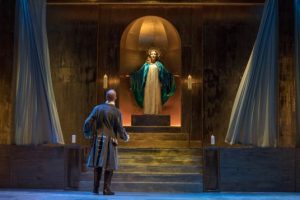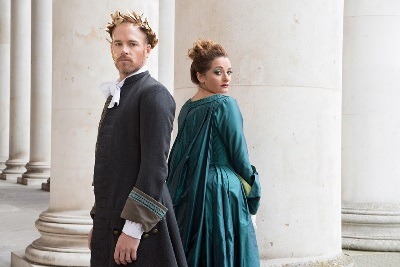Cleopatra’s seductive powers have beguiled writers down the ages, and it’s not surprising that her exploits inspired Handel to create Giulio Cesare in Egitto (‘Julius Caesar in Egypt’), an opera that was a huge hit at its first performances in 1724, and which has remained enduringly popular. All the Handel opera ingredients are there: strong female characters, an exotic setting, a classical hero and scope for a typically baroque convoluted plot and I’m absolutely thrilled that English Touring Opera have chosen it for this autumn’s tour, coming to Durham next week.
To do Cesare full justice, ETO are splitting it across two nights, so that they’re able to perform it without cuts. To link the two performances smoothly, it’s been into two overlapping parts, so you’ll get a “previously in Egypt” recap at the beginning of part 2. Some of the critics were sceptical about the long recap, but I note that the press performances were a matinée and evening performance, rather than two separate nights, so they’d have been coming back to the repeat after an hour or so break rather than a day later. I’m delighted about it myself, as not only does this give me two consecutive nights of Handel opera, and a rare opportunity to see a complete performance of my favourite, but the portion they’re recapping at the beginning of the second night gives us a second chance to hear one of the best arias of the opera, Cleopatra’s searing ‘Se pietà’ in which she implores the gods to protect Caesar as he goes off to war – it’s this aria that ETO are using in the trailer for this production.
In many ways, Giulio Cesare marks the summit of Handel’s opera career. When he wrote it, he was enjoying considerable professional success and prosperity, and was about to settle in his new house at Brook Street, where he remained for the rest of his life. For Cesare Handel had secured the services of two Italian superstar singers, the castrato Senesino and soprano Francesca Cuzzoni in the lead roles, and the attraction of these singers plus Handel’s reputation ensured the opera’s success. It’s packed with good tunes, and enriched by a large orchestra, including horns for the famous hunting aria ‘Va tacito’.
Handel remained single all his life, but he was fond of female company, and in his operatic writing, he certainly seems to understand and be very sympathetic to his female characters. Handel’s women are never mere ornaments, they are often fiercely trying to take control of their destiny, and in his music he gives them scope for great depths of expression and psychological development. In Giulio Cesare Cleopatra begins as a mere flirt, hoping to use her sexuality to get Caesar to support her against her brother, as she sings the aria ‘Tutto può donna vezzosa’ – everything is possible for a beautiful woman, but over the course of the opera, we see her falling deeply in love and becoming committed to Caesar. By contrast, the other female character, Cornelia, is a picture of steadfast virtue in the face of constant hardships.
Many of Handel’s lead male parts were written for castrati singers, and today those castrati roles are played either by countertenors or female altos or mezzo-sopranos. English Touring Opera are offering us a mixture, with Christopher Ainslie and Benjamin Williamson playing the rivals Cesare and Tolomeo (Ptolemy), whilst Kitty Whately sings the part of Sesto, the son of Cornelia and Pompey. The only low-voiced lead role is that of Tolomeo’s henchman Achilla, sung by Benjamin Bevan.
Here’s a summary of the plot, told through my favourite arias, and collected in a Spotify using the fine live recording by Marc Minkowski and Les Musiciens du Louvre.
Act 1:
Caesar arrives in Egypt after defeating Pompey. Cornelia, Pompey’s wife, pleads with Caesar for mercy, and he is all set to forgive his enemy when Achilla arrives with a gift from the Egyptian king Tolomeo – Pompey’s severed head.
Caesar is enraged and disgusted at Tolomeo’s action and expresses his rage with “Empio, dirò, tu sei” – “I will say, You are pitiless, wholly cruel”
Cornelia, now Pompey’s widow, reacts with a dignified lament: “Priva son d’ogni conforto” – I am bereft of all comfort, and later on in Act One, accompanied by a sinister, heavy tread in the orchestra, she sings “Nel tuo seno, amico sasso” to the urn containing Pompey’s ashes – “Within your bosom, friendly marble, my treasure lies buried”. Her son Sesto, on the other hand, gets one of Handel’s most glorious rage arias, “Svegliatevi nel core”, – “awake within my breast furies of a wounded soul” as he girds himself up for revenge, egged on by urgent violins, and in the contrasting central section calls on his father’s soul to come to his aid and give him strength.
Cleopatra meanwhile has decided to take advantage of Caesar’s rage to enlist his help to overthrow her brother Tolomeo. She’s confident that she can lure him onto her side, because after all “Tutto può donna vezzosa” – everything is possible for a beautiful woman.
Cornelia meanwhile is subjected to the unwanted attention of Achilla, who has been promised her by Tolomeo. Remember men, even if you’re singing an aria with all the throbbing passion of “Tu sei il cor di questo core”, no still means no.
Act 2:

Cleopatra has already seduced Caesar, but in disguise. And their love is expressed in a strange dream sequence, in which Cleopatra appears as a goddess, surrounded by the muses. Her aria, “V’adoro, pupille”, – “I adore you, dear eyes”, is one of the big set-piece scenes of the opera. But, as I mentioned above, my own favourite is “Se pietà di me non senti”, in which Cleopatra’s expresses her fears as Caesar goes off to war against her brother.
Sesto is planning revenge on Tolomeo for the murder of his father, and in an opera full of good tunes, Sesto gets some absolute crackers – “L’angue offeso mai riposa” – The angered snake never rests
until it has spilled its poison and then at the end of Act 2, when he has failed to kill Tolomeo, and is rousing himself from his own gloom, he sings “L’aure che spiro” – “The cruel tyrant does not deserve to draw the air he breathes”.
Act 3:
Tolomeo has reneged on his promise to let Achilla have Cornelia, because he wants her himself. Achilla plans to defect to Caesar’s side, so he is stabbed Tolomeo, but before he dies, Achilla is able to hand control of Tolomeo’s army to Caesar. In another fiery aria, Tolomeo gloats at what he expects will be victory over his sister: “Domerò la tua fierezza” -I shall tame your pride, which abhors and scorns my throne.
Cleopatra thinks that Caesar has been killed, and that Cornelia and Sesto have been forestalled, and expresses her grief in a fragile, lonely aria that seems to stop time: “Piangerò la sorte mia” – “I will lament my lot, so harsh arid cruel”.
Sesto eventually succeeds in killing Tolomeo, bursting in on him just as he’s attempting to force himself on Cornelia, who, finally delivered from her troubles sings with “Non ha più che temere” – “My soul, now avenged, has no more to fear”, an aria brimming over with sweet relief.
Caesar, of course, has survived, and the opera ends in general happiness as he crowns Cleopatra Queen, and they pledge their love and fidelty, the soprano and alto lines entwining in a duet – if at times the opera feels a bit top heavy with all the high voices, love duets like this one really work well when the voices are so close together (think too of Nero and Poppea’s “pur ti miro” at the end of Monteverdi’s Incoronazione di Poppea, although this duet is much more decent than that one).
As required by convention, the opera ends with a crowd scene of general rejoicing.








